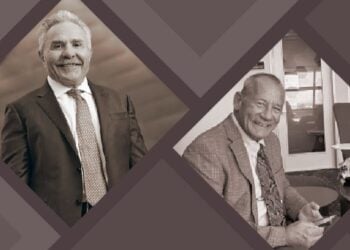Located in the historic Pence Building in downtown Minneapolis, not far from courtrooms and the offices of many of their clients, the attorneys at MADEL PA occupy an office space that is unconventional for a law firm. Exposed duct work and wires lace the ceiling above an open work area the focal point of which is a central kitchen. Staff and attorneys work together, without the encumbrances of walls and closed doors.
Managing Partner Jennifer Robbins explained how this space reflects the personality of this boutique firm of five attorneys whose practice centers on complex business litigation, government investigations and criminal defense. “We chose this building because it doesn’t feel like a law firm. We’re in a temporary space now, waiting to build out our own offices on the floor above us, and we’ve taken over a space that used to belong to a firm of graphic designers. It is intentionally unfinished looking, but it feels like us. In our build-out, we want to go for this same feeling of openness and exposure. We’re fairly casual in our office. We don’t wear suits every day if we’re not in court. Authenticity is a word that gets overused, but I think it’s easier to connect with people when you’re up front about who you are. There’s no man behind the curtain. I just told a client who was visiting our office for the first time, ‘This space looks really different. Don’t expect walls.’ He laughed and said, ‘That’s exactly what my space looks like. It’s all about the people, right?’”
His comment reflects the changing consumer expectations of attorneys. Smaller, more practice-specific, service-driven firms seem to be on the rise in this post-recession economy. Robbins observed, “I think the legal space is, in large part, undergoing an identity crisis. For so long, when all the white shoe firms were at their prime, clients wanted to be ‘good enough’ for those attorneys to work on their files. That has changed. Since the market crash, there has been a lot more focus on efficiency and using the ‘best’ lawyers as opposed to law firms, and I think the reality has hit home that we are in a service industry. It’s weird to me to think that wasn’t always the perception.”
Robbins grew up in San Antonio, Texas, earned her law degree at the University of Texas Law School, and accepted an off er at a prominent litigation firm with offices in Minneapolis. Once there, she excelled under the mentorship of attorney Chris Madel, and eventually earned a firm equity partnership. When Madel decided to form his own firm, he invited Robbins to join him as managing partner. In her new leadership role, Robbins is committed to leading with transparency. “Chris has always given me opportunities to lead from early on. I try to empower people to make decisions on their own. We have an environment here of mutual trust.”
As a next generation attorney whose legal talent and bold leadership have already taken her far, Robbins said she finds inspiration working as a team and doing meaningful work. “I don’t really consider myself a millennial. In my personality, I tend to be more Gen X, and I’m right on the cusp of the two generations. Other than Chris, I’m the oldest on a team of young attorneys. But no one here is satisfied with being a cog in an impersonal machine. We all want to work with people who we know want the same things. We work hard, and we have a good time while we’re working hard.”
Robbins explained the virtues of a team practice model: “We know each other well, and we share cases. There are at least two or three attorneys on each case, with a different mix for each one. If things get too busy on one case, someone who is not as involved can step in and keep things going forward. Since we are less structured, we can see where the need is and fill in the gaps.”
This purposeful collaboration means clients get constant attention. It also fosters a more collegial practice culture. “There is none of that internal competition here. It’s easy for that to happen in a large office, even when they encourage cross-selling. When you go through a trial with someone, they become like family. I feel grateful all the time to work in this kind of environment.”
That team identity extends to the firm’s two staff members. “Our staff are also listed on our website. That’s not always the case with a large firm, but they are a huge part of why we are successful. We want our clients to understand that and to know our staff are just as valued as everyone else.”
According to Robbins, being clear about who you are as a law firm is a crucial first step toward success. While large firms can get caught in the difficult position of trying to be all things to all clients, smaller firms can be more focused and nimble. “I think we’re quicker to react than when you’re required to go through a large hierarchy. As small firm attorneys, we are more present than a large firm might allow. We can be more creative, and as a result, we’ve taken on cases that would not necessarily have fit a big firm culture. We also want our clients to feel comfortable knowing exactly who is working on their files. Who you hired is who you get, and we all have a lot of heart.”
Her many years of leadership in various organizations have helped to prepare Robbins for her new role at MADEL PA. Her service as a board member for Minnesota Women Lawyers and for the Minnesota Board of Psychology (to which she was appointed by Gov. Mark Dayton) have provided her with a broader perspective and a community of other leaders she can call upon when seeking advice. “I think people oft en talk about being on boards in terms of a mentoring opportunity or because it looks good on a resume. But it’s been very important to my professional development. A board presents a situation where you are forced to discuss an issue and make a decision together. You engage in dialogue about why to do something or not. It’s been invaluable to me to see how professionals from all different groups – small firms, large firms, government, business, nonprofits – see things and reach conclusions.”
Being hands-on in the day-to-day operations of the firm has been a huge growth experience for Robbins. “Not everyone has a chance to start a new business and be there as it happens and make decisions. I’m able to contribute value to this new enterprise beyond my experience as an attorney. As a partner in our previous firm, I did a lot of administrative tasks, and I felt like I was part of a giant machine of forms and meetings. Now, I feel like my time is spent on things where I can see a result. That’s been really rewarding so far. Chris has been incredibly supportive, and I’m grateful for his trust.”
Five of MADEL PA’s seven attorneys and staff are women, and the firm is a partner of Minnesota Women Lawyers. “I want to advance women in the profession, and my colleagues here are just as invested in making sure women in the profession are treated fairly and well.” The firm also gives back to the profession by providing regular assistance to federal public defenders.
Robbins has successfully represented both plaintiff s and defendants in an impressive repertoire of high-stakes matters spanning antitrust violations, trade secret misappropriation, complex class actions, regulatory matters, and other commercial litigation involving white-collar criminal charges, government investigations, and allegations of professional misconduct. She recently obtained an extremely rare order against the U.S. Department of Justice, wherein the federal judge noted that the Department of Justice “lost all credibility” with him due to Robbins’ advocacy.
When Robbins and her colleagues describe themselves as trial lawyers, they mean it. “It’s at the core of who we are. It’s not just something we say; litigation is what we do. When people are in trouble, we want them to call us because they trust us, and they know we are staunch advocates. It’s a privilege to do the work we do. I’m still humbled by the experience of getting up in court and saying, ‘Jennifer Robbins on behalf of … .’ It’s a huge deal to be someone’s voice.”







